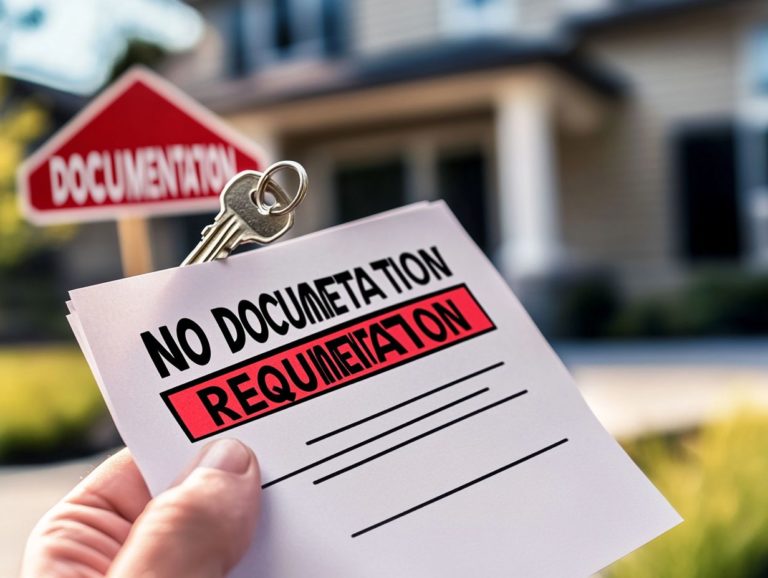Top 10 FAQs About Mortgages Answered
Navigating the world of mortgages can feel overwhelming, especially with a myriad of questions swirling in your mind. Whether you re stepping into homeownership for the first time or considering refinancing, grasping the intricacies of mortgages is essential.
This article tackles the most frequently asked questions to illuminate your path, covering the fundamentals of what a mortgage is and exploring the different types available. You ll discover how mortgages operate, what costs to anticipate, and valuable tips for selecting the right lender all crafted to empower you on your journey toward homeownership.
Contents
- Key Takeaways:
- 1. What Is a Mortgage?
- 2. How Does a Mortgage Work?
- 3. What Are the Different Types of Mortgages?
- 4. What Is the Difference Between Fixed and Adjustable Rate Mortgages?
- 5. How Much Can I Borrow for a Mortgage?
- 6. What Are the Requirements for Getting a Mortgage?
- 7. How Do I Choose the Right Mortgage Lender?
- 8. What are closing costs and how much should I expect to pay?
- 9. Can I refinance my mortgage?
- 10. What happens if I can’t make my mortgage payments?
- What are the pros and cons of getting a mortgage?
- How Can I Improve My Chances of Getting Approved for a Mortgage?
- What Are the Common Mistakes to Avoid When Getting a Mortgage?
- What Are the Current Mortgage Rates?
- How Long Does It Take to Pay off a Mortgage?
- What Are the Tax Benefits of Having a Mortgage?
Key Takeaways:
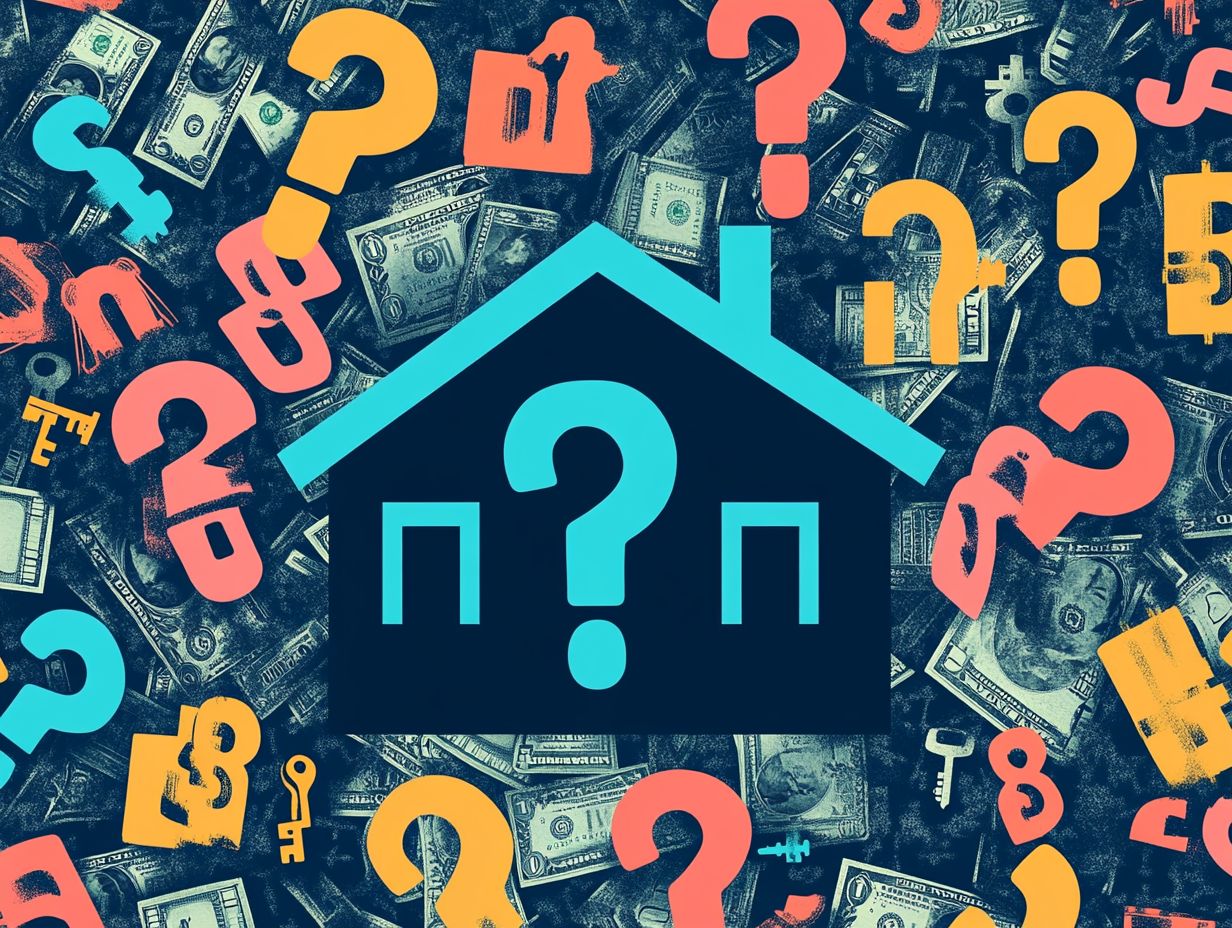
A mortgage is a loan to buy a home or property. Understand the different types of mortgages to make the best choice for your finances. A good credit score, stable income, and low debt-to-income ratio are key to qualifying for a mortgage.
1. What Is a Mortgage?
A mortgage is essentially a financial partnership where a lender provides the funds needed to purchase your dream home, secured by the property itself. This arrangement allows you to step into homeownership without having to cough up the entire purchase price upfront.
It s a complex process that encompasses interest rates, down payment requirements, and the various closing costs you ll encounter when finalizing the loan. Understanding your mortgage options is crucial for success. You might want to explore:
- FHA loans
- VA loans
- USDA loans
Each is designed to cater to different financial situations and aspirations.
Navigating the mortgage landscape can seem daunting, especially with the myriad of choices at your fingertips. Work closely with lenders who can guide you based on your unique financial circumstances.
Recognizing the importance of equity where you gradually own a portion of your property plays a crucial role in building wealth over time. This understanding gives you the power to make informed decisions and helps set realistic expectations throughout the mortgage process, ensuring you re fully prepared to embrace the responsibilities that come with homeownership.
2. How Does a Mortgage Work?
Understanding how a mortgage works is essential for you as a homebuyer. It involves various financial components, including interest rates, monthly payments, and the overall mortgage payment structure that shapes your path to ownership over time.
When you enter into a mortgage agreement, the structure typically consists of principal and interest, culminating in monthly payments throughout a specified term. These payments depend on the interest rate, which can dramatically influence the total amount you ll pay over the loan’s lifetime. Consider how different rates affect your monthly payments and total costs.
Manual underwriting is key in assessing your financial profile, allowing for a comprehensive evaluation that goes beyond standard algorithms. An escrow account is often set up to hold money for expenses like property taxes and insurance. This not only aids in budgeting but can also significantly impact your financial stability during your journey of homeownership.
3. What Are the Different Types of Mortgages?
Exploring the various types of mortgages available is crucial for you as a potential homeowner. Each option be it a fixed-rate mortgage, adjustable-rate mortgage, FHA loans, or conventional loans presents unique benefits tailored to your individual financial situation.
By understanding these distinctions, you can make informed choices that align with your financial goals. For example, a fixed-rate mortgage offers stability with consistent monthly payments, making it an appealing choice if you plan to stay in your home for the long haul.
On the other hand, adjustable-rate mortgages might catch your eye if you’re seeking lower initial rates, though it’s important to stay mindful of the potential for rising payments over time.
Government-backed options like FHA and VA loans can be gateways to homeownership, especially for those with lower credit scores or no down payment. These valuable pathways cater to diverse budgets and lifestyle needs, allowing you to find the right fit for your journey into homeownership.
4. What Is the Difference Between Fixed and Adjustable Rate Mortgages?
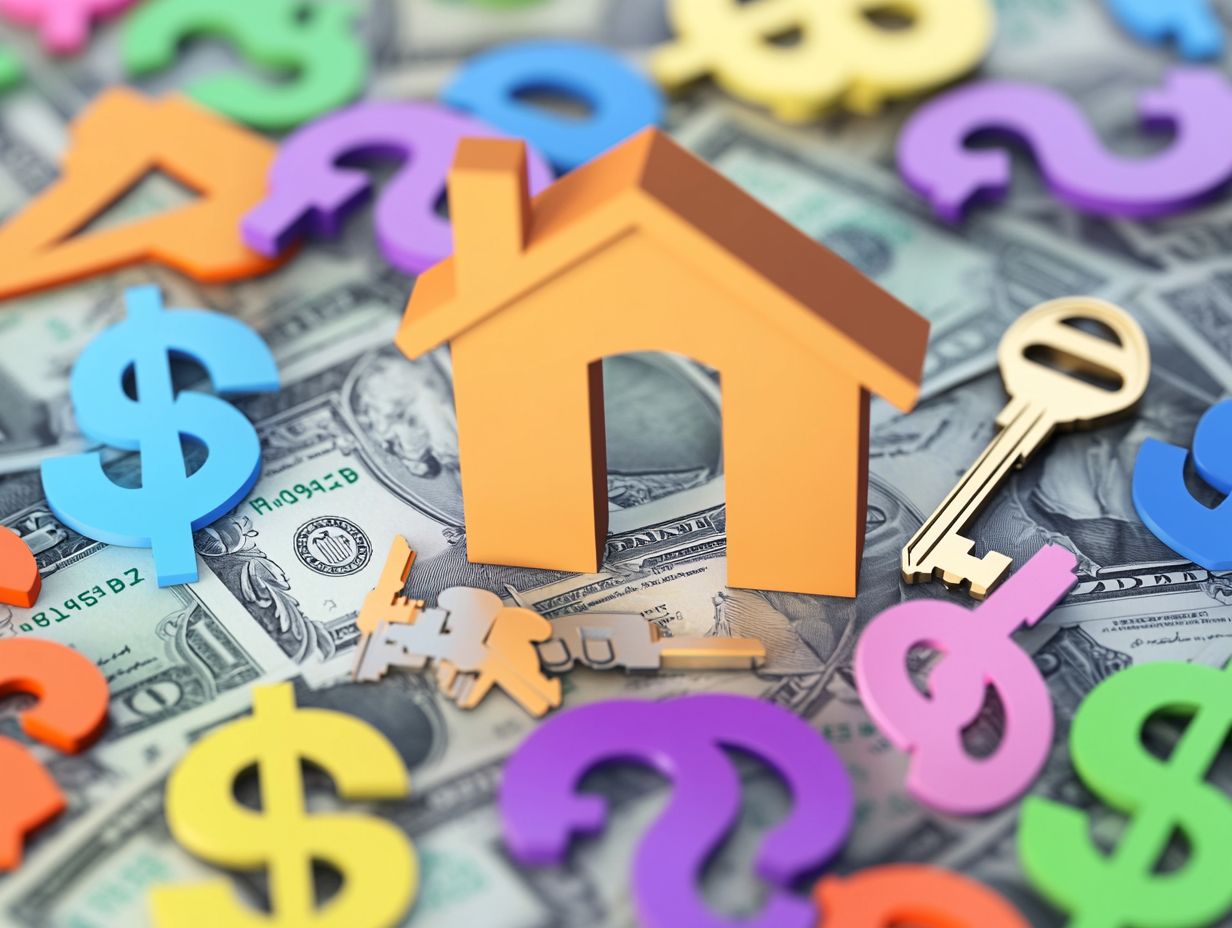
Understanding the difference between fixed-rate and adjustable-rate mortgages is essential. Each caters to different financial goals and preferences when it comes to interest rates and payment stability over time.
A fixed-rate mortgage offers you the comfort of a consistent interest rate throughout the loan term. This allows for predictable monthly payments that can simplify your budgeting process.
An adjustable-rate mortgage typically begins with a lower initial interest rate that can change after a set period. This leads to fluctuating monthly payments based on market conditions. It can be advantageous if you anticipate moving or refinancing within a few years, as you may enjoy lower payments in the short term.
However, if you re seeking long-term stability, especially if you plan to remain in your home for an extended period, the predictability of fixed rates is often the more appealing choice.
5. How Much Can I Borrow for a Mortgage?
Determining how much you can borrow for a mortgage is a crucial step in your home-buying journey. It requires a clear understanding of lender criteria, including your credit score, monthly take-home pay, and whether you are prequalified or preapproved.
Your credit score reflects your financial reliability. It directly affects the interest rates and terms available to you. A stable income establishes your capacity to manage monthly repayments and reassures lenders of your financial stability.
Existing debts can reduce how much a lender will offer. It’s essential to grasp the difference between being prequalified and preapproved.
Prequalification offers you a general sense of your borrowing power. Preapproval involves a more thorough examination of your financial situation, often leading to a higher potential borrowing limit. Understanding these nuances gives you the power to navigate the mortgage landscape with confidence.
6. What Are the Requirements for Getting a Mortgage?
Securing a mortgage entails navigating a variety of requirements that you, as a potential borrower, must fulfill. These include:
- Maintaining a satisfactory credit score
- Providing an adequate down payment
- Understanding manual underwriting processes
- Obtaining homeowners insurance
Your journey begins with the credit score, which typically needs to be at least 620 for conventional loans. Some programs might accommodate lower scores.
Many lenders expect you to provide anywhere from 3% to 20% of the home’s purchase price as a down payment. This will influence your monthly payments and overall loan terms.
Homeowners insurance is another critical component, safeguarding both your property and the lender s investment. It is often mandated by mortgage companies.
For those with unique financial situations, manual underwriting allows lenders to assess your creditworthiness using more than just numerical factors. However, be prepared for stricter requirements and potentially longer processing times.
7. How Do I Choose the Right Mortgage Lender?
Choosing the right mortgage lender can make or break your home-buying journey. Actively research and compare lenders to ensure you make the best choice.
As you assess potential lenders, prioritize interest rates. These rates have a direct impact on your monthly payments and overall financial well-being.
Prioritize customer service as well. Having responsive and knowledgeable representatives can significantly ease the stress that often accompanies the mortgage process.
Exploring a range of loan options ensures you can identify products tailored to your specific financial situation.
To navigate this landscape effectively, consider consulting with a mortgage consultant or buyer’s agent. Their insights can guide you towards the lender that aligns best with your needs and financial goals. This ultimately makes your home-buying experience smoother and more rewarding.
8. What are closing costs and how much should I expect to pay?
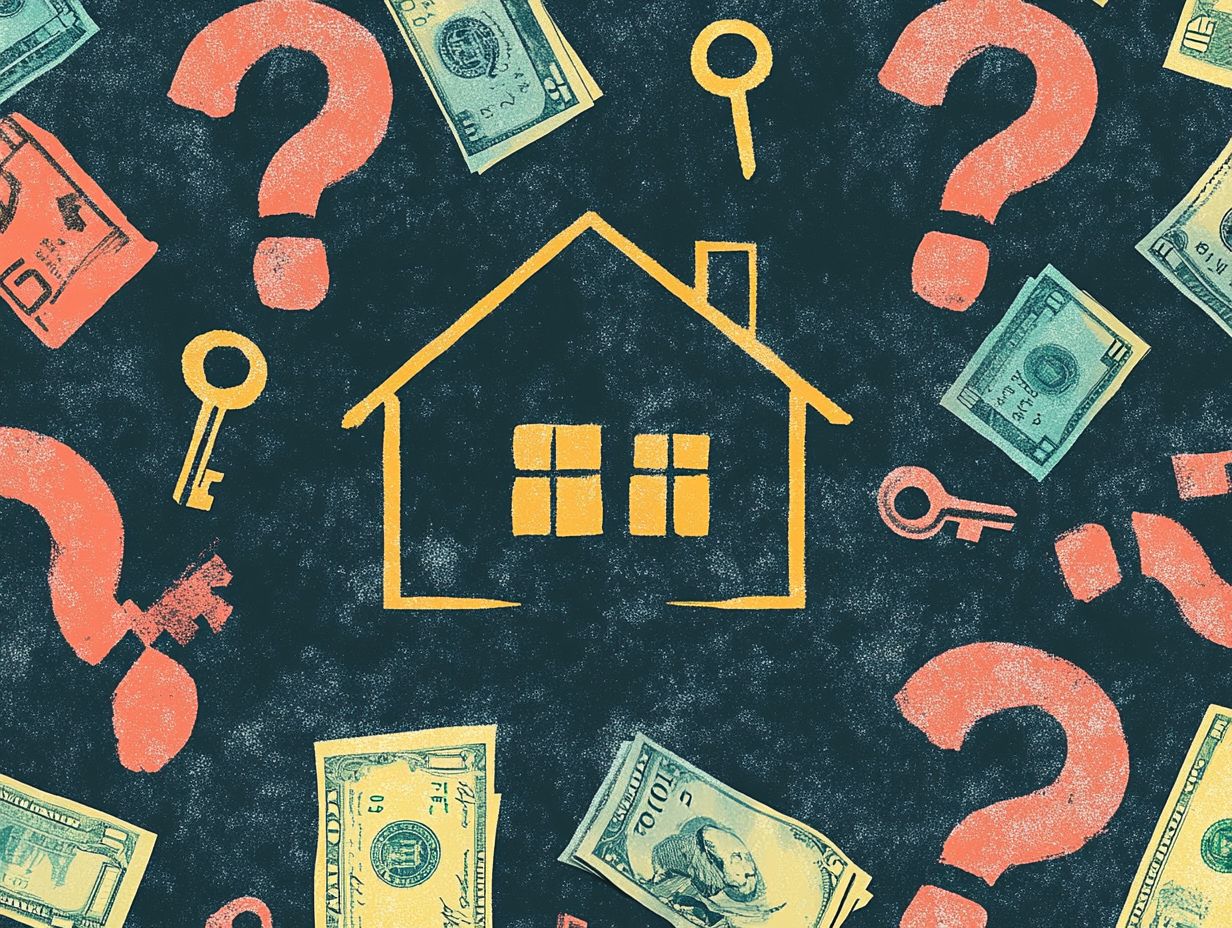
Closing costs are an essential consideration when finalizing your mortgage, comprising various fees and expenses you should anticipate during the home buying journey. Typically, these costs range from 2% to 5% of the home s purchase price.
These expenses include:
- Appraisal fees, which confirm that the property’s value aligns with the loan amount,
- Title insurance to shield you from any legal claims,
- Contributions to an escrow account where money is held for property taxes and insurance.
To prepare effectively for these financial commitments, start by requesting a detailed breakdown of expected closing costs from your lender. Setting aside funds in advance perhaps in a dedicated savings account will enable you to budget appropriately without compromising your financial goals. Explore local programs that might assist with these expenses for valuable relief.
9. Can I refinance my mortgage?
Refinancing your mortgage can be an excellent strategy if you’re looking to take advantage of interest rate fluctuations or access your home’s equity. This approach allows you to align the terms of your mortgage with your evolving financial goals.
Essentially, this process involves replacing your current mortgage with a new one, ideally securing a lower interest rate or more favorable terms that better fit your financial situation. For example, if your credit score has improved significantly, you might qualify for more attractive interest rates, leading to lower monthly payments.
While the immediate benefits include reduced payments and access to cash for home renovations or other expenses, it’s crucial to consider the closing costs and any potential penalties for terminating your existing mortgage. Weigh these drawbacks against the long-term financial benefits to make a well-informed decision.
10. What happens if I can’t make my mortgage payments?
Failing to make mortgage payments can lead to serious repercussions, including losing your home, which can profoundly affect your financial goals, credit score, and future borrowing capabilities.
Such scenarios can create a ripple effect, impacting various aspects of your financial landscape, making it imperative for you to grasp the implications.
If missed payments persist without resolution, your interactions with lenders may become strained, reducing your available options. Fortunately, there are alternatives for those encountering financial challenges:
- Loan modifications can adjust your terms to make payments more manageable.
- Forbearance provides a temporary reprieve by pausing or reducing payments.
Act quickly and communicate with your lenders to explore these options before it’s too late.
What are the pros and cons of getting a mortgage?
Evaluating the pros and cons of obtaining a mortgage is essential for you as a potential homeowner. Weigh the benefits of homeownership and the opportunity to build equity against your responsibilities of monthly payments and potential financial risks.
For many, the allure of owning a home offers a promise of stability, enabling individuals and families to establish roots in a community while savoring the pride that comes with ownership.
This journey often entails monthly payments that contribute to long-term equity, transforming into a financial asset that can significantly influence your future investments or retirement plans. However, it s vital for you to recognize the inherent challenges posed by fluctuating real estate markets, which can impact property values and disrupt the predictability of your monthly budget.
Thoughtfully navigating these aspects can help you align homeownership with your broader financial goals, ensuring a more secure and fulfilling future.
How Can I Improve My Chances of Getting Approved for a Mortgage?
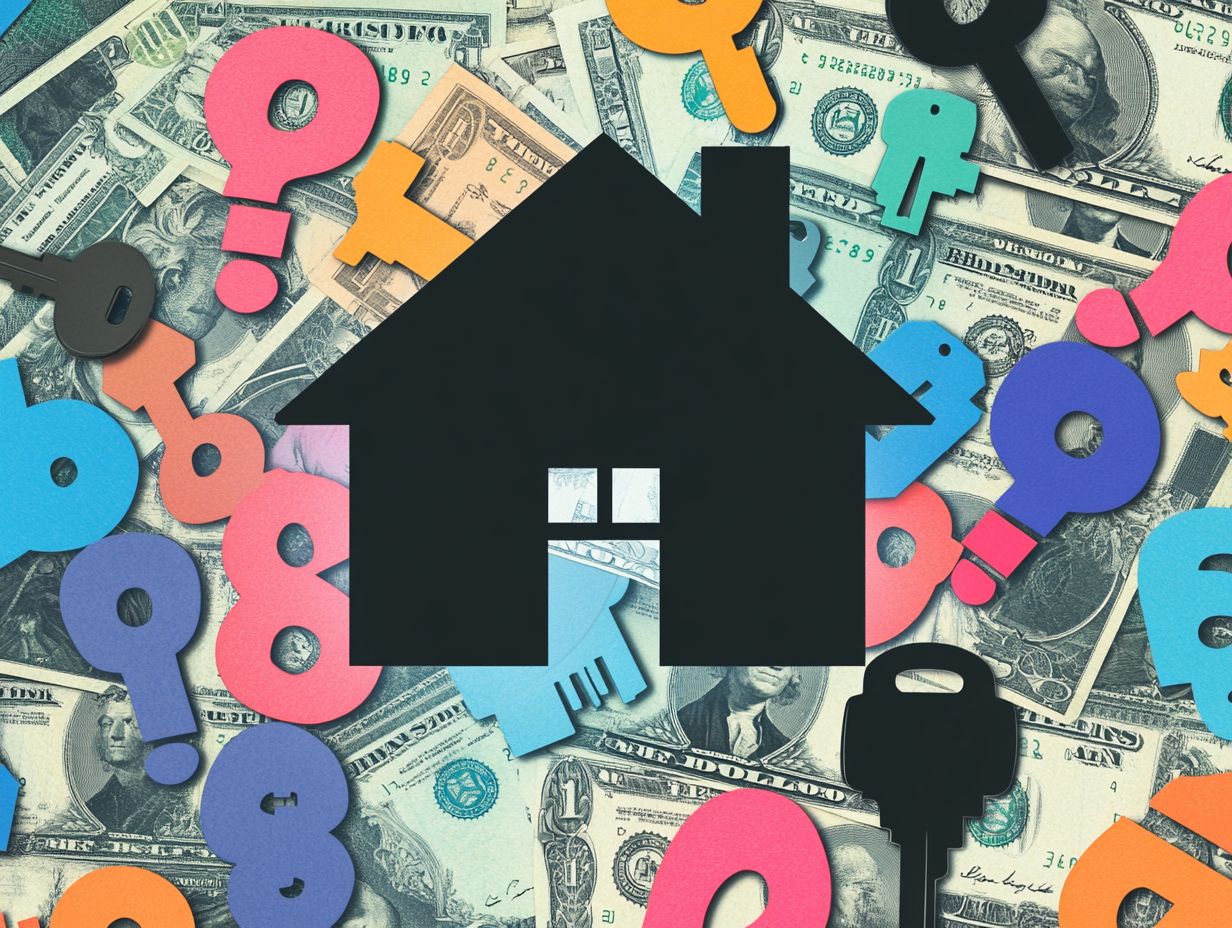
Improving your chances of getting approved for a mortgage involves proactive steps. Focus on enhancing your credit score, obtaining prequalification, and understanding what lenders seek in potential borrowers.
A higher credit score opens the door to better interest rates and signals a trustworthy financial history, which lenders highly value.
Prequalification is a useful tool. It gives you a sneak peek into your eligibility and borrowing power without triggering a hard inquiry on your credit.
Presenting a strong financial profile complete with stable income and a low debt-to-income ratio further boosts your chances of approval.
Ultimately, these strategies not only enhance your likelihood of securing a mortgage but also play a vital role in achieving long-term financial goals, such as homeownership and building equity.
What Are the Common Mistakes to Avoid When Getting a Mortgage?
Avoiding common mistakes when securing a mortgage is crucial for you as a prospective homeowner. Oversights like failing to get preapproved, underestimating closing costs, or neglecting homeowners insurance can lead to unnecessary financial strain.
Preparation is essential. Many homebuyers overlook the importance of gathering all necessary documents or thoroughly assessing their financial standing, which can result in less favorable loan terms.
It s vital for you to understand the various costs involved, extending beyond just the monthly mortgage payment. Ignoring rates and loan options can be detrimental, as you might end up with higher interest rates that significantly inflate the overall cost of your home over time.
By approaching the mortgage process with diligence and informed insight, you can reduce these risks and make decisions that align with your long-term financial goals.
What Are the Current Mortgage Rates?
Staying informed about current mortgage rates is crucial for you as a homebuyer. These rates can fluctuate based on lender offerings and market conditions, significantly influencing your overall borrowing costs and monthly payments.
Understanding how to find and compare current mortgage rates is essential for securing the best deal possible. Various factors, such as your credit score, economic indicators, and even geopolitical events, can lead to significant shifts in these rates.
By evaluating multiple offers, you can uncover substantial savings over time.
Utilizing mortgage calculators will greatly assist you in assessing the affordability of different rates. This helps you predict how varying interest levels will impact your monthly budget and overall financial health.
Knowledge is power on this financial journey, and being proactive will empower you to make smarter decisions.
How Long Does It Take to Pay off a Mortgage?
The timeline for paying off a mortgage can vary significantly based on the loan term, interest rates, and your agreed monthly payments. This makes it a crucial factor to consider as you establish your financial goals.
Recognizing that typical mortgage terms range from fifteen to thirty years can help you understand the long-term implications of your financial commitments.
As interest rates fluctuate, they influence your monthly repayment amounts and the total interest you ll pay over the life of the loan.
When you consider making additional payments toward the principal, you can significantly reduce the overall interest paid and shorten the duration of your mortgage.
By adopting proactive strategies like refinancing for better rates or setting up automatic payments that exceed the minimum requirement you can empower yourself to accelerate your path to financial freedom and achieve your goals sooner.
What Are the Tax Benefits of Having a Mortgage?
Understanding the tax benefits of having a mortgage can shape your financial strategy. By leveraging mortgage interest deductions, you can align your home financing with your financial goals.
These tax advantages can make homeownership more affordable. The interest on your mortgage is often deductible, effectively lowering your taxable income.
This deduction can lead to substantial savings come tax season. You might also qualify for credits that ease your financial load.
Consider these elements carefully. They can enhance your current finances and pave the way for a secure future.
Frequently Asked Questions
What is a mortgage?
A mortgage is a loan used to buy a home, typically repaid over 15 to 30 years, with interest.
What is the difference between a fixed-rate and adjustable-rate mortgage?
A fixed-rate mortgage has a set interest rate throughout the loan term. An adjustable-rate mortgage has a variable rate that can change.
How much can I borrow for a mortgage?
The amount you can borrow depends on your income, credit score, and the property’s value.
What is the minimum down payment required for a mortgage?
The minimum down payment varies by lender and loan type but is typically between 3.5% and 20% of the purchase price.
What is mortgage pre-approval?
Mortgage pre-approval is when a lender reviews your finances to decide how much they re willing to lend you before you start house hunting.
How can I improve my chances of getting approved for a mortgage?
To boost your chances, maintain a good credit score, save for a larger down payment, and have a stable income. Working with a mortgage broker can help too.




